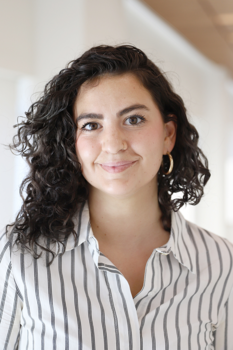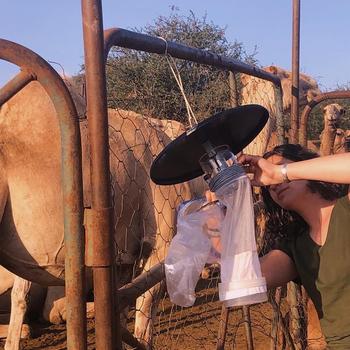In This Story
Mason’s MS in global health primes future graduates for frontline public health initiatives

This summer, Abigail Lilak, who is in her second year of the MS global health program, worked in conjunction with EcoHealth Alliance to conduct research on processing water, tick, soil, and leech samples in Kenya. With Mpala Research Centre, a research center based in central Kenya, Lilak worked on a program to detect, predict, and contain illnesses spread between people and animals, also known as zoonoses.
Lilak credits her courses for laying a strong foundation to work with EcoHealth. The MS in Global Health in the College of Health and Human Services teaches students epidemiology, biostatistics, sociocultural influences on health and behavior, global health systems, communicable and non-communicable diseases of global importance, and migrant health. Graduates are prepared to be leaders in global health-related research.
“I went to Kenya to help implement the water processing protocols,” Lilak said. “For EcoHealth, I focused on the water samples. I conducted lab work which consisted of filtering samples, homogenization, extraction, and eventually DNA sequencing. I was also able to participate in field work and sample collections.”
With guidance from her mentors Yvonne Linton, PhD, Michael von Fricken, PhD, Maureen Kamau, DVM, Dawn Zimmerman, DVM, and Brian Bourke, PhD, Lilak participated in field work and sample collections using advanced technologies. MinIONs, for example, is a device that makes it possible to process DNA information in real-time. Lilak’s research methods included metagenomic sequencing, a technique that allows researchers to identify the genetic material of environmental microbes with very little prior knowledge. In Kenya, this was useful for finding common pathogens like African tick-bite fever and East Coast fever.

OneHealth focuses on the importance of the roles humans, animals, and the environment play in the transmission of diseases and the management of zoonotic events. Lilak’s specific research sought to probe into how ticks or livestock waterholes may be reservoirs of infection. Because people and animal life cohabitate in the landscape, it is important to pinpoint how and where the disease transmission is occurring in order to effectively mitigate infection exposure.
Lilak was encouraged to apply to EcoHealth one of her mentors Michael von Fricken, an associate professor in the Department of Global and Community Health. Along with other graduate and undergraduate students, Lilak was a part of von Fricken’s Public Health Study Abroad course that took them to Laikipia, Kenya, to study tick dragging and water filtration.
“Mason’s MS in Global Health helped me realize the impact I could have on public health even as a student and connected me with great resources and programs that allow me to gain real-world research experience,” said Lilak “In March, I attended Mpala with other Mason students. If I hadn't experienced that course, I don't think I would have been able to accomplish what I did this summer.”
In addition to EcoHealth, Lilak worked with many other prominent organizations within public health. Partners of the project included Navy Medical Research Center (NMRC), Navy Entomology Center of Excellence (NECE), Walter Reed Biosystematics Unit (WRBU), Smithsonian Institute, Mpala Research Centre and University of Norte Dame.
After the conclusion of her work in Kenya, Lilak presented her research alongside her cohort of EcoHealth. Participants with diverse topics were able to share their findings via Zoom.
Now that her research with EcoHealth is complete, Lilak intends to use an aspect of her water research for her master’s thesis. She is hopeful that this experience will lead to other opportunities to conduct global health research with many different organizations. Lilak is also looking forward to continuing her work at the Walter Reed Biosystematics Unit (WRBU).
